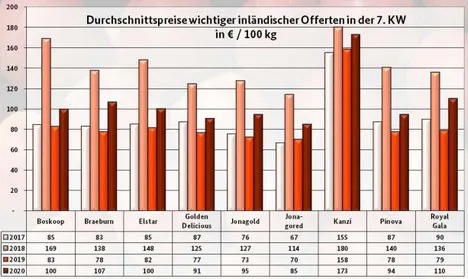German apples formed the basis of the product range; primarily Elstar, Jonagold and Braeburn. As a rule, they were qualitatively sound; only in certain areas there were some problems. For fruit with organoleptic defects, discounts were naturally unavoidable, which is why the prices for local Holstein Cox fell in Berlin. Meanwhile, domestic Braeburn and Royal Gala arrived in Frankfurt in a relaxed fashion. This was standard for the Italian and French batches: Golden Delicious and Granny Smith from Italy and Pink Lady and Granny Smith from France played an important role.
In general, demand was not particularly strong due to the rainy and stormy weather. However, after distributors had sufficiently adjusted the supply to the weaker demand, prices hardly moved at all. Turkish imports appeared in Frankfurt: Golden Delicious and Starking in 70/75 mm and Red Delicious in 80/85 mm were quickly absorbed. In Berlin, Cripps Pink was delivered from Austria: They cost € 2.- per kilo in 70/75 mm. Dutch and Belgian influxes had a complementary character at best.

Pears
Italian Abate Fetel, Santa Maria and Williams Christ dominated the event. Supplies from overseas apparently expanded. The batches from overseas did sometimes not have the right coloration.
Table grapes
South African offers shaped the market. Interest was not particularly lively. However, reduced supply generally ensured constant prices.
Oranges
For the blonde oranges, Navelina from Spain was the preferred choice. With the blood oranges there were mainly Moro and Tarocco from Italy. The bad weather had a positive effect on sales.
Small citrus fruits
The rainy and stormy weather intensified the sales of the predominantly Spanish Clemenvilla and Israeli Orri. A wide range of products was available, with Spanish Nadorcott, Hernandina, Murcott and Tango forming the foundation.
Lemons
Spanish Primofiori dominated as usual at this time of the season. The quality left nothing to be desired. An unexcited sale and an interest that was satisfied without any problems ensured constant valuations.
Bananas
The sales were continuously quiet. However, the influx from the ripening plants had been adjusted quite well to the halfway reasonable sales opportunities.
Cauliflower
Italian and French offers shaped the event. The presence of the Spanish dumping increased overall. Due to the intensified competition, the prices of French and Italian batches could not keep up with their level of the 06th KW.
Lettuce
Iceberg lettuce came exclusively from Spain. The availability had increased, but the interest was not significant. So prices However, it was not always possible to clear the market.
Cucumbers
The cucumber market was dominated by Spanish and Greek games. The Netherlands and Belgium took part in the business on a larger scale. This had a direct impact on the prices, as they dropped on quite a broad front.
Tomatoes
Events were uneven: too much availability, too little interest, too high incoming demands or insufficient quality were observed.
Sweet peppers
Spanish lots dominated the market, more so than Turkish and Moroccan games. The sale took place without any special incidents. The quality left some wishes open here and there, so that a wide price range was established.
Source: BLE
